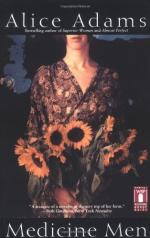|
This section contains 241 words (approx. 1 page at 300 words per page) |

|
In American literature and popular culture, physicians generally appear as one of two stereotypes. The first is like the doctors of Medicine Men, selfish, self-important people more concerned with their own aggrandizement than with the people they are supposed to help. These sorts of doctors often serve as symbols of inhumane, remote industries or government organizations, as in Joseph Heller's Catch-22 (1961; see separate entry). Most such portrayals of doctors reflect the public's dissatisfaction with medical professionals who too often seem dispassionate or more concerned with making money and living luxuriously than with practicing medicine.
The second stereotype is of the physician as demigod, a supercompassionate being who fights mightily to help the helpless and heal the sick. Max Brand's Doctor Kildare series of books (beginning with Calling Dr. Kildare, 1940), and the subsequent motion pictures and television episodes adapted from his books, exemplifies this stereotype, with young...
|
This section contains 241 words (approx. 1 page at 300 words per page) |

|




